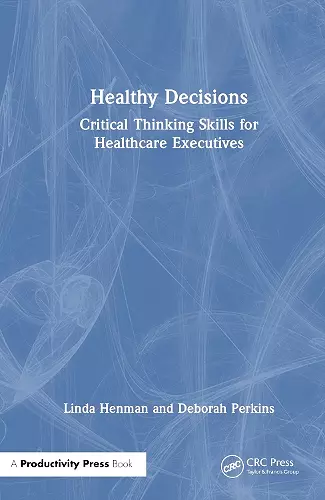Healthy Decisions
Critical Thinking Skills for Healthcare Executives
Linda Henman author Deborah Perkins author
Format:Hardback
Publisher:Taylor & Francis Ltd
Publishing:30th Apr '25
£145.00
This title is due to be published on 30th April, and will be despatched as soon as possible.
This hardback is available in another edition too:
- Paperback£28.99(9781032980713)

In the wake of an international pandemic, Healthy Decisions: Critical Thinking Skills for Healthcare Executives emerges as a crucial guide for leaders navigating the complex world of healthcare management. This thought-provoking book challenges the status quo, arguing that the success of healthcare organizations hinges not on abstract concepts like "culture," but on the concrete decisions executives make. Drawing from real-world experience with large systems like Mercy and Banner Health, specialty hospitals like Ranken Jordan Pediatric Bridge Hospital, insurance companies like Blue Cross Blue Shield, and nonprofit elder care systems, the authors provide a practical guide to help healthcare executives make the tough decisions they can’t afford to get wrong.
With more than eight decades of combined consulting experience with diverse healthcare organizations, the authors present a compelling case for the paramount importance of decision-making in healthcare leadership. They argue that executives must embrace the messy, pragmatic reality of running healthcare organizations. This book offers a roadmap for healthcare leaders who want to move beyond vague discussions of culture and focus on the specific, high-stakes decisions that shape the climate of their organizations. Healthy Decisions offers a fresh perspective on organizational climate, asserting that it's shaped by a series of daunting decisions, not nebulous factors. The book provides invaluable insights into:
- The pitfalls of using "culture" as a convenient excuse for organizational failures
- The important role of well-developed analytical thinking skills in effective leadership
- Strategies for making difficult decisions more consistently, quickly, and accurately
- Real-world examples and research findings that illuminate the path to better decision-making
- The dispassionate thinking skills needed to assess risks and tradeoffs effectively
- How to inspire teams to embrace change, disruption, and innovation
This essential roadmap equips healthcare executives with the tools to unlock their decision-making potential, avoid the traps of indecision, and ultimately improve the health of their organizations. Whether you're a seasoned healthcare leader or an aspiring executive, Healthy Decisions will transform your approach to leadership and organizational success in an increasingly uncertain world.
ISBN: 9781032980683
Dimensions: unknown
Weight: unknown
176 pages